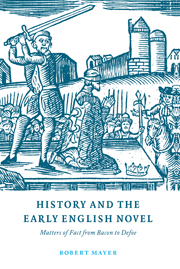Book contents
- Frontmatter
- Contents
- List of illustrations
- Acknowledgments
- Introduction
- 1 Baconian historiography: the contours of historical discourse in seventeenth-century England
- 2 “Idle Trash” or “Reliques of Somthing True”?: the fate of Brut and Arthur and the power of tradition
- 3 The History of Myddle: memory, history, and power
- 4 Lifewriting and historiography, fiction and fact: Baxter, Clarendon, and Hutchinson on the English Civil War
- 5 The secret history of the last Stuart kings
- 6 “Knowing strange things”: historical discourse in the century before Robinson Crusoe
- 7 “History” before Defoe: Nashe, Deloney, Behn, Manley
- 8 Defoe's historical practice: from “The Ages Humble Servant” to Major Alexander Ramkins
- 9 “Facts that are form'd to touch the mind”: Defoe's narratives as forms of historical discourse
- 10 From history to the novel: the reception of Defoe
- Conclusion
- Index
- CAMBRIDGE STUDIES IN EIGHTEENTH-CENTURY ENGLISH LITERATURE AND THOUGHT
1 - Baconian historiography: the contours of historical discourse in seventeenth-century England
Published online by Cambridge University Press: 31 October 2009
- Frontmatter
- Contents
- List of illustrations
- Acknowledgments
- Introduction
- 1 Baconian historiography: the contours of historical discourse in seventeenth-century England
- 2 “Idle Trash” or “Reliques of Somthing True”?: the fate of Brut and Arthur and the power of tradition
- 3 The History of Myddle: memory, history, and power
- 4 Lifewriting and historiography, fiction and fact: Baxter, Clarendon, and Hutchinson on the English Civil War
- 5 The secret history of the last Stuart kings
- 6 “Knowing strange things”: historical discourse in the century before Robinson Crusoe
- 7 “History” before Defoe: Nashe, Deloney, Behn, Manley
- 8 Defoe's historical practice: from “The Ages Humble Servant” to Major Alexander Ramkins
- 9 “Facts that are form'd to touch the mind”: Defoe's narratives as forms of historical discourse
- 10 From history to the novel: the reception of Defoe
- Conclusion
- Index
- CAMBRIDGE STUDIES IN EIGHTEENTH-CENTURY ENGLISH LITERATURE AND THOUGHT
Summary
In 1659 Peter Heylyn, an Anglican divine and well-known historian, launched an attack on Thomas Fuller's Church-History of Britain that occupied the better part of two books by Heylyn and elicited a lengthy reply by Fuller in his own defense. This assault was represented by Heylyn as a principled struggle (“Truth is the Mistresse that I serve”) to correct Fuller's methodological lapses: his carelessness in regard to the facts, his stylistic idiosyncrasies, and his partiality. In the end, however, Heylyn moved well beyond his particular “animadversions” on Fuller's text, and the attacks on Fuller's Church-History served not just a corrective but a delegitimizing function. Heylyn likened Fuller to a “Roman comedian” whose work was interlarded with “Merry Tales, and scraps of Trencher-Jests,” and cited the historian Josephus's observation that “there are some [historians] who do spend themselves on the stile and the dresse, as if their businesse rather were to delight the ear then inform the judgement.” Heylyn suggested that Fuller was one such historian and argued that Fuller had failed to ensure that his work was “framed by the Levell and Line of Truth.” But despite Heylyn's apparent highmindedness, his aims ultimately were more ideological than methodological. As Heylyn arraigned him, Fuller was not just a writer who was careless with the facts and stylistically flippant; he was also hypocritical and destructive: “[He] hath intermingled his Discourse with some Positions of a dangerous nature, which … may not only overthrow the whole power of the Church as it stands constituted and established by the Laws of the Land, but lay a probable foundation for the like disturbances in the Civil State.”
- Type
- Chapter
- Information
- History and the Early English NovelMatters of Fact from Bacon to Defoe, pp. 18 - 33Publisher: Cambridge University PressPrint publication year: 1997

